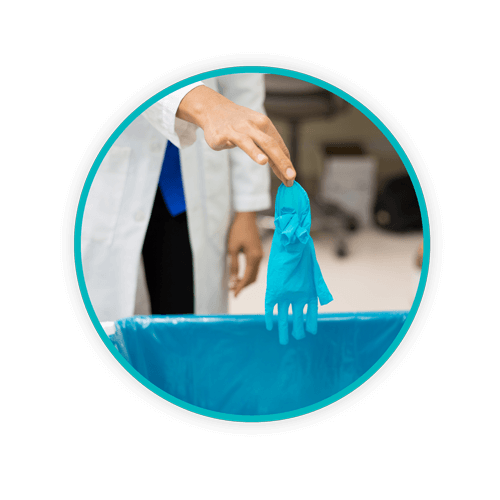5 Essential New Year’s Resolutions to Adopt in 2024

The start of a new year always marks another chance for improvement. For healthcare facilities, this means it is the perfect time to review the way your staff handles waste management. As best practices for waste disposal are ever-changing, it’s beneficial to take a moment to consider what changes can be made to make day-to-day practices more streamlined and practical for staff. This can ensure greater employee satisfaction and retention as well as improved patient experiences.
The good news is that facilities can always make improvements, and this is particularly true where waste management processes are concerned. Safety and compliance are at the forefront of every facility’s culture. So it’s helpful to begin by considering how these areas can be improved. Here are a few key resolutions to help your teams start the new year off on the right foot.
OUR KEY NEW YEAR RESOLUTIONS:
1 / Make Training on Safe Waste Handling a Priority
4 / Improve Controlled Substance Disposal
5 / Discover New Ways to Improve Sustainability
6 / Make the New Year the Best One Yet
Resolution #1: Make Training on Safe Waste Handling a Priority

Safety for both staff and patients is a top priority, and it is only fitting that creating a safer work environment through a focus on education should be your first resolution. Medical waste presents unique challenges. Employees must know how to distinguish and deal with items such as needles and other sharps, cytotoxic wastes, and soiled items. This is key not only to proper disposal but also to handling and disposing of each type of waste in a manner that is safe for both staff and patients alike.
This is also a matter of compliance, as safety regulations often require facilities to provide orientations and annual refreshers to staff that may handle certain categories of waste. It is important to be aware of any local or national requirements and ensure that all necessary training is in place to meet or exceed them.
Resolution #2: Improve Waste Segregation
Taking the necessary steps to segregate waste streams properly can bring several benefits. The first of these is ensuring compliance with government regulations regarding the segregation of certain waste streams. However, proper waste segregation is not just about compliance but also can greatly reduce environmental impacts and operating costs.
Out of all the waste healthcare organizations generate, 85% is non-hazardous general waste, which can be disposed of through ordinary channels. Further, many types of waste require less treatment and correspondingly cost less when disposed of correctly. Utilizing color coded waste bins can help ensure waste ends up in the correct receptacle, even in the most hectic of hospital environments.
By ensuring that only regulated wastes end up in medical waste containers and are placed within the correct category of containers, healthcare facilities can ensure they are not paying more to dispose of waste improperly. This can also ensure that non-hazardous waste can be disposed of through more environmentally friendly disposal options such as recycling.
Resolution #3: Reduce Unnecessary Waste

Reducing waste spending is a key concern for all healthcare facilities, and a key area for achieving this is waste management. The World Health Organization has stated that more than half of all the non-hazardous waste hospitals generate is composed of paper and cardboard. Taking steps such as using email and text messages instead of paper, keeping recycling bins ready for use in key areas, and using reusable dishes and nursing gowns can greatly reduce the amount of paper waste generated and cut disposal expenses.
Another major step for facilities that are using disposable medical waste containers is making the switch to reusable containers. Facilities can use high-quality reusable containers such as those from Daniels Health, thus eliminating the need to use the cardboard containers or plastic liners necessary for disposable containers. Eliminating these can equate to a major reduction in both plastic and cardboard waste, reducing costs as well as the time it takes for staff to deal with changing out full containers.
Resolution #4: Improve Controlled Substance Disposal
Failing to properly dispose of controlled substances is one of the most common ways to become non-compliant. Moreover, when staff handle medications improperly, it poses a serious risk to patients and employees. Therefore, staff must secure controlled substances before and during disposal to guarantee safety and compliance.
Facilities generally must render certain types of medicine inert before disposal. Rather than implementing risky DIY solutions like flushing or mixing with litter, professionals turn to deactivating agents like Secure a Drug. Solutions like Secure a Drug utilize a carbon-based formula that breaks down controlled substances, readying them for final disposal in a safety-designed container. Adding a measure like Secure a Drug to the disposal process for any expired and unneeded drugs and medication can greatly boost peace of mind for medical teams.
Resolution #5: Discover New Ways to Improve Sustainability

Every year that goes by, climate change becomes a more pressing issue. With environmental concerns looming over medical facilities, administrators are prioritizing sustainability more and more. Incorporating sustainability is a facility-wide process that affects every step of every job. Yet, ecologically sound waste disposal is one of the foremost concerns for environmental impact.
Improving sustainability in your waste management strategy should begin with a waste audit. Assessing where trash is created, where in the facility it travels, and where it goes for final disposal allows for discovering greater efficiencies and potential for greener tactics. Switching to reusable containers is an easy way to boost sustainability, as is carefully segregating waste streams to avoid cross-contamination of sensitive waste.
Make the New Year the Best One Yet
The new year brings new opportunities to reduce waste, improve safety, and achieve greater environmental sustainability for your facility. By incorporating these suggestions into any plans for the upcoming new year, it is possible to achieve all of these goals and more. The waste experts of Daniels Health can help you create a plan for the new year that takes into account your facility’s unique needs as well as relevant regulatory factors to help ensure this new year is filled with high grades in both compliance and team satisfaction.
Let's Talk!
Your time is valuable, and we don’t want to play hard to get. You can either phone us directly on the details listed on our contact page, or feel free to fill out this short form and one of our team members will get back to you as quickly as possible.
